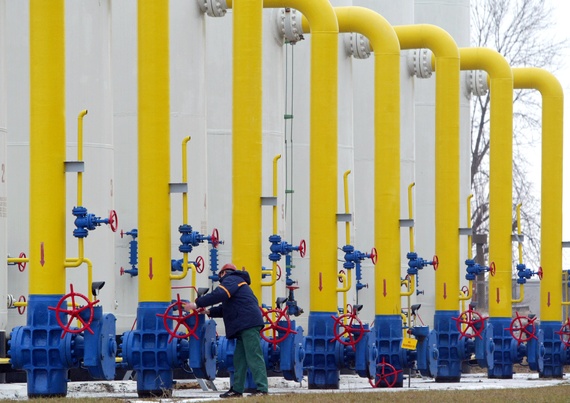
Ukraine May Harm Itself by Slapping Sanctions on Russia
Publication: Eurasia Daily Monitor Volume: 11 Issue: 160
By:

On September 10, Ukrainian President Petro Poroshenko signed into law a bill on sanctions against Russia (president.gov.ua, September 10). The law was published in official newspapers on September 11, which gave Poroshenko legal grounds to, as soon as September 12, slap sanctions on Russia for annexing Crimea in March, arming pro-Russia militants in the eastern Donbas region since about the same time, and sending regular Russian troops there more recently. Yet, Poroshenko hesitates. Just like Western sanctions against Russia, Ukrainian sanctions could backfire. Furthermore, Ukraine could do more harm to itself than to Russia if it introduced sanctions, because Russia as a trading partner is ultimately more important to Ukraine than vice versa.
Ever since the West began to introduce its piecemeal sanctions against Russia last spring, Ukraine has been calling for more and tougher economic measures because Moscow was not changing its behavior. However, Ukraine did not hurry to introduce its own sanctions. While unhappy with France over its reluctance to cancel a contract to supply Mistral helicopter carriers to Russia, Ukraine itself continued to deliver engines for Russian military helicopters and supply components and services, in particular, to the Russian strategic missile forces (Forbes.ua, June 4; RIA Novosti, September 5).
On August 8, Ukrainian Prime Minister Arseniy Yatsenyuk announced that his cabinet prepared a list of 172 persons and 65 firms that would be subjected to sanctions. Ukraine’s parliament approved the bill on sanctions on August 14. It contains a list of 25 possible measures, including, but not limited to, the blocking of assets, trade and transit restrictions, license and contract cancellations, and visa bans. Yatsenyuk said property confiscation would be possible, but the list does not contain this measure (Pravda.com.ua, August 8; Interfax, August 14; golos.com.ua, September 11).
Prime Minister Yatsenyuk did not name any companies or individuals, but he emphasized that the sanctions could be applied to transit. This was generally interpreted as threat to Gazprom, which relies on Ukrainian pipelines in pumping natural gas to the European Union, especially as the national oil and gas company Naftohaz Ukrainy on August 11 advised EU companies to revise their contracts with Gazprom if parliament approved sanctions against Russia (naftogaz.ua, August 11).
Gazprom has not been selling gas to Ukraine since June 16, over a debt and pricing dispute. However, Ukraine cannot pull the plug on Russian gas without hurting itself. First, this would complicate Ukraine-EU relations at a time when Ukraine needs Europe as an ally against Russia. Second, the natural gas Ukraine has been pumping from Hungary and Poland since last spring and from Slovakia since September 2 is essentially Russian gas pumped in reverse, so Ukraine would be unable to import gas if it closed its pipelines to Gazprom. At the same time, dependence in this area is mutual, as half of the gas sold to the EU by Gazprom last year went through Ukrainian pipelines (zn.ua, January 30). This is despite Russia’s efforts to divert gas flow from Ukraine, in particular through the Nord Stream pipeline.
Moreover, Ukrainian sanctions would hurt Ukraine more than Russia because Russia takes in 20 percent of Ukrainian merchandise exports, even after exports to Russia fell by 23 percent in the first half of 2014, and for 29 percent of imports (ukrstat.gov.ua, accessed September 12). Ukraine is much less important for Russia in this regard, as its share in Russia’s merchandise trade turnover was less than 5 percent over the same period (gks.ru, accessed September 12). Ukraine depends on Russia not only for natural gas, but also for fuel for its four nuclear plants, which account for half of national power generation. Possible sanctions against Russian banks would also likely backfire as four of Ukraine’s 11 biggest banks are Russian-owned. These are the local subsidiaries of Sberbank, VTB and Alfa, as well as Prominvestbank, which is controlled by the Russian state-owned bank VEB (banker.ua, accessed September 12).
Since summer 2013, Russia has banned Ukrainian confectionery and dairy products, soya beans, sunflower seeds, corn, fruit juices, canned vegetables and fish for spurious reasons (dni.ru, September 5). Even after that, Russia still accounts for more than one-eighth of Ukrainian agricultural exports (minagro.gov.ua, August 27). Russia has retaliated for Western sanctions with a ban on Western food. It is likely to do the same with Ukraine. The gradual opening of the EU agricultural market to Ukrainian goods, which has been taking place since the approval by the EU of an assistance package for Ukraine in March 2014 and the signing of the EU-Ukraine free-trade deal in June, cannot compensate for the possible loss of the Russian market for Ukrainian agricultural exporters, at least in the short term.
Given that the EU published a new list of tougher sanctions against Russian banks as well as oil and defense firms on September 12 (eur-lex.europa.eu, September 12), it will be even more difficult for Poroshenko to explain to Western allies and the growing radical electorate at home why Ukraine has not introduced its own sanctions against the aggressor state. At the same time, Ukraine will inevitably need more Western assistance if it passes sanctions on Russia, and Russia retaliates.




